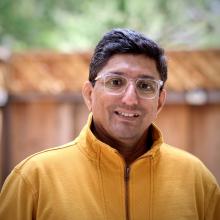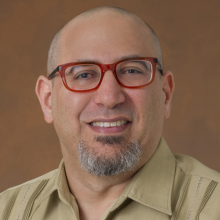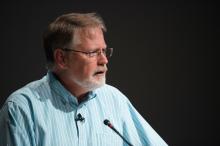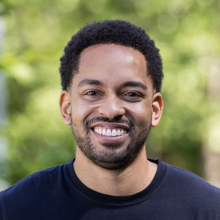Past Seminars
The HCII Seminar Series has been a weekly tradition at CMU since 1990. Details of our seminars from 2014 to present, as well as many of their recordings, are available below. A few years ago, we held a year of special programming in celebration of the seminar's 25th anniversary.
| Date | Title | Speaker | Talk title and Abstract |
|---|---|---|---|
| HCII Seminar Series - Hoda Heidari |
Hoda Heidari K&L Gates Career Development Assistant Professor of Ethics and Computational Technologies at Carnegie Mellon University |
"GenAI Evaluations: The Broken Bus from Transparency to Accountability" Evaluations have become a central mechanism for governing generative AI systems, underpinning claims about transparency, safety, and accountability. This talk begins with an overview of the contemporary GenAI… Full Details |
|
| HCII Seminar Series - Andrew Begel |
Andrew Begel Associate Professor in the Software and Societal Systems Department |
"Become an Ally to Autistic Colleagues in the Workplace with INTENT: Interactive Tool for Empathy in NeuroTypicals" The INteractive Tool for Empathy in NeuroTypicals (INTENT) is an interactive web-based experience that will positively impact everyday life and reduce everyday… Full Details |
|
| HCII Seminar Series - Sarah Preum |
Sarah Preum Assistant Professor of Computer Science at Dartmouth College and Technical Associate Director of the Dartmouth Center for Precision Health & AI |
"From Cognitive Burden to Collaborative Intelligence: Socio-Technical AI for Clinical Communication" Modern healthcare increasingly depends on digital communication, including patient portal messages, and telehealth platforms. While essential, such communication platforms impose a… Full Details |
|
| HCII Seminar Series - Nesra Yannier |
Nesra Yannier Senior Systems Scientist and Special Faculty |
"Bringing AI Tutoring into the Physical World and Scaling to Schools and Museums" With the rapid advancement of AI and other emerging technologies, there is great potential to improve learning at scale. Yet it remains unclear how these technologies should be designed to maximize… Full Details |
|
| HCII Seminar Series - Karina Ricks |
Karina Ricks Partner at Cityfi Advisors |
"Policy - Obstacle or Opportunity?" Disruptive technology often lives in a policy grey zone - uncharted spaces where ambiguity offers opportunity to experiment, iterate, and accelerate. But as new technologies reach scale, policy inevitably catches up—often reactively, shaped more… Full Details |
|
| HCII Seminar Series - Polo Chau |
Polo Chau Professor at Georgia Tech, School of Computational Science and Engineering |
"Visual and Algorithmic Interpretation for Responsible AI" Our group, the Polo Club of Data Science, develops novel visual and algorithmic tools to help make sense of AI behaviors and risks. Our Safe AI research thrust investigates AI vulnerabilities and develops countermeasures… Full Details |
|
| HCII Seminar Series - Colin Lea |
Colin Lea |
This is the annual Sujeath Pareddy Memorial Lecture. "Speech, Signing, & AI: Accessibility for All" Speech-oriented interaction is ubiquitous in consumer technology, yet most systems are not fully accessible for the millions of people who have speech or… Full Details |
|
| HCII Seminar Series - Alessandro Oltramari |
Alessandro Oltramari President of the Carnegie Bosch Institute at Carnegie Mellon University and Senior Manager at Bosch Research Technology Center (RTC) |
"Decision Making in the Cyber-Physical World" Recent advances in generative AI have enabled systems that can engage in fluid conversation, assist with writing, research, and problem-solving. However, when we move from purely digital domains to the cyber-physical world—where… Full Details |
|
| HCII Seminar Series - Na Du |
Na Du Assistant Professor in the Department of Informatics and Networked Systems, School of Computing and Information at the University of Pittsburgh |
"Towards Situation-Aware and Trustworthy Technologies for Human-Agent Teaming" Emerging autonomous technologies like automated vehicles, robots, and drones, must amplify human capabilities and partner reliably with people in safety-critical settings such as transportation,… Full Details |
|
| HCII Seminar Series - Aditya Vashistha |
Aditya Vashistha Assistant Professor of Computing and Information Science at Cornell University |
"Towards Globally Equitable AI" AI has the power to drive meaningful change, but its benefits have remained concentrated among privileged communities in the West, which account for only a small fraction of the global population. Even conversations about AI risks are rooted in Western… Full Details |
|
| HCII Seminar Series - Alex Mariakakis |
Alex Mariakakis Assistant Professor, Department of Computer Science, University of Toronto |
"Embracing Ubiquitous Technology to Complement, Scale, and Extend Traditional Healthcare" Traditional healthcare is centered around face-to-face interactions between patients and clinicians. While these human relationships are important for establishing empathetic and ethical care… Full Details |
|
| HCII Seminar Series - David Gagnon |
David Gagnon Scientist III, Wisconsin Center for Education Research, University of Wisconsin - Madison |
"Developing a New Public Media and Open Research Platform with Video Games" Joan Cooney and her contemporaries transformed 1970s television into a platform for public education and inclusion. Programs such as Sesame Street coordinated designers, artists and researchers to not only… Full Details |
|
| HCII Seminar Series - Abhijit Thosar |
Abhijit Thosar Head of Research and Design |
"Designing with AI: The Next Frontier in Human-AI Collaboration" Abhijit Thosar, a seasoned design leader, invites students to explore how Agentic AI is reshaping how we design digital systems. As AI shifts from passive tools to autonomous agents, Human-Computer Interaction enters… Full Details |
|
| HCII Seminar Series - Lisa Anthony |
Lisa Anthony Associate Professor, Department of CISE, University of Florida |
* TALK POSTPONED - Will be rescheduled at a later date *
"Mentoring as a Way of Life: Scholarship in a Post-LLM World" The role of the teacher-scholar includes a significant component of mentoring junior students or colleagues to become… Full Details |
|
| HCII Seminar Series - Michael Bernstein |
Michael Bernstein Associate Professor, Computer Science, Stanford University |
Sujeath Pareddy Memorial Lecture Sujeath Pareddy was a PhD student in the Human-Computer Interaction Institute from 2018 to 2022. He brought his passion for computing systems and physics to bear on hard, long-standing challenges in accessibility for people with… Full Details |
|
| HCII Seminar Series - Kathleen Mercury |
Kathleen Mercury Lecturer, Cal Poly Humboldt School of Education |
"CreAItivity: The Creative Process, AI, and the Place Between" The role of AI in the creative process is a difficult prospect for many people in creative… Full Details |
|
| HCII Seminar Series - David Widder |
David Widder Postdoctoral Fellow at the Digital Life Initiative at Cornell Tech |
"AI Supply Chains: Tools to Locate Power and Responsibility in AI Production for Critical, Accountable Computing" Contemporary AI production is structured to enable ignorance of harm for those who want it, and complicate resistance for those who don’t. Through case studies of the… Full Details |
|
| Special HCII Seminar - Scott Davidoff |
Scott Davidoff Principal Research Scientist, NASA Jet Propulsion Laboratory |
"HCI and the Search for Life in the Universe" The biggest science questions – like whether life arose multiple times in the universe – are profoundly team efforts, even though many of our scientific tools and customs are oriented around disciplinary silos. This talk will describe… Full Details |
|
| HCII Seminar Series - Byungjoo Lee |
Byungjoo Lee Mechanical Engineer and Associate Professor in the Department of Computer Science,Yonsei University, Seoul, South Korea |
"A Decade of Research on Interaction Under Time-Pressure: Key Insights and Future Directions" Research on time-pressured interactions in the history of HCI has been surprisingly scarce. In this talk, I will present a decade of my research, arguing that the rapid growth of related… Full Details |
|
| HCII Seminar Series - Gary Hsieh |
Gary Hsieh Associate Professor in Human Centered Design & Engineering at University of Washington |
"Accelerating Research Translation into Design Practice Using Generative AI" Many valuable insights embedded in scientific publications are siloed and rarely translated into results that can directly benefit humans. This contributes to the so-called research-practice gaps, impedes… Full Details |
|
| HCII Seminar Series - Misha Sra |
Misha Sra John and Eileen Gerngross Assistant Professor at the University of California, Santa Barbara |
"Design of Human-AI Systems to Augment Human Potential" At the Human-AI Integration Lab (HAL), we design, build, and study human-AI systems that amplify human potential by enhancing cognitive, creative, physical, and social capabilities. This talk will explore the challenges of… Full Details |
|
| Special HCII Seminar Series - Nick Hobbs |
Nick Hobbs Designer, New Generative AI Products, Google |
"How to Build a New Generation of AI Native Products" We’ve seen an explosion of investment in AI infrastructure and foundation models, yet a commensurate surge of popular AI products has yet to follow. In this talk, we’ll explain the dearth of existing products, examine building… Full Details |
|
| HCII Seminar Series - Chris Golias |
Chris Golias Senior User Experience Researcher, Gemini Internationalization, Google |
"Decolonizing LLMs: An Ethnographic Framework for AI in African Contexts" We examine LLM deployment through African lenses, utilizing and reflecting on ethnographic methods to engage with the continent’s unique technolinguistic landscape. Drawing from primary research in Ethiopia… Full Details |
|
| HCII Seminar Series - Dan Russell |
Dan Russell Adjunct Lecturer, Human AI Group, Computer Science Department, Stanford University |
"People and Online Research, Now That They’re Doing AI" Given all of the press that LLMs have garnered, it’s worthwhile asking if they’re changing the ways people find information. Are LLMs pulling traffic away from the search engines? Just as importantly, how do… Full Details |
|
| HCII Seminar Series - Mark Riedl |
Mark Riedl Professor, Georgia Tech School of Interactive Computing, and Associate Director of the Georgia Tech Machine Learning Center |
"Human-Centered Explainable AI" Artificial intelligence systems are increasingly involved in high-stakes decision-making, such as healthcare, financial, and educational determinations. Many have called for explainable AI (XAI), which are AI systems that provide human-… Full Details |
|
| Special HCII Seminar - Ujwal Gadiraju |
Ujwal Gadiraju Assistant Professor, Human-Centered AI and Crowd Computing, Software Technology Department, Delft University of Technology |
"The Human Quotient for Better AI Systems" The unprecedented rise in the adoption of artificial intelligence techniques and automation in many contexts is concomitant with the shortcomings of such technology concerning robustness, interpretability, usability, trustworthiness… Full Details |
|
| HCII Seminar Series - James Landay |
James Landay Professor of Computer Science and the Anand Rajaraman and Venky Harinarayan Professor in the School of Engineering at Stanford University |
“AI For Good” Isn’t Good Enough: A Call for Human-Centered AI AI for Good initiatives recognize the potential impacts of AI systems on humans and societies. However, simply recognizing these impacts is not enough. To be truly Human-Centered, AI development must be user-… Full Details |
|
| HCII Seminar Series - Martez Mott |
Martez Mott Senior Researcher, Ability Team, Microsoft Research Redmond |
"Designing Accessible Virtual Reality Experiences for People with Limited Mobility" Virtual Reality (VR) offers compelling ways for people to interact with digital content in various domains such as education, gaming, communication, and design. However, VR platforms can be… Full Details |
|
| ACM Distinguished Speaker and HCII Special Presentation - Ronald Baecker |
Ronald Baecker Emeritus Professor of Computer Science, University of Toronto |
"Digital Dreams Have Become Nightmares: What We Must Do -- A Call to Action" For 80 years, digital technology visionaries have imagined and created systems to support human knowledge, learning, creativity, medicine, health, communications, community, commerce, power, and… Full Details |
|
| HCII Seminar Series - Takahiro Yabe |
Takahiro Yabe Assistant Professor, Department of Technology Management and Innovation (TMI), Center for Urban Science and Progress (CUSP), Tandon School of Engineering, New York University |
"Understanding the Complexity of Social Interactions at the City Scale" The quantity and quality of social encounters in urban environments are crucial elements that drive economic mobility and build social capital. Where in cities do we observe the most and least diversity in… Full Details |




























